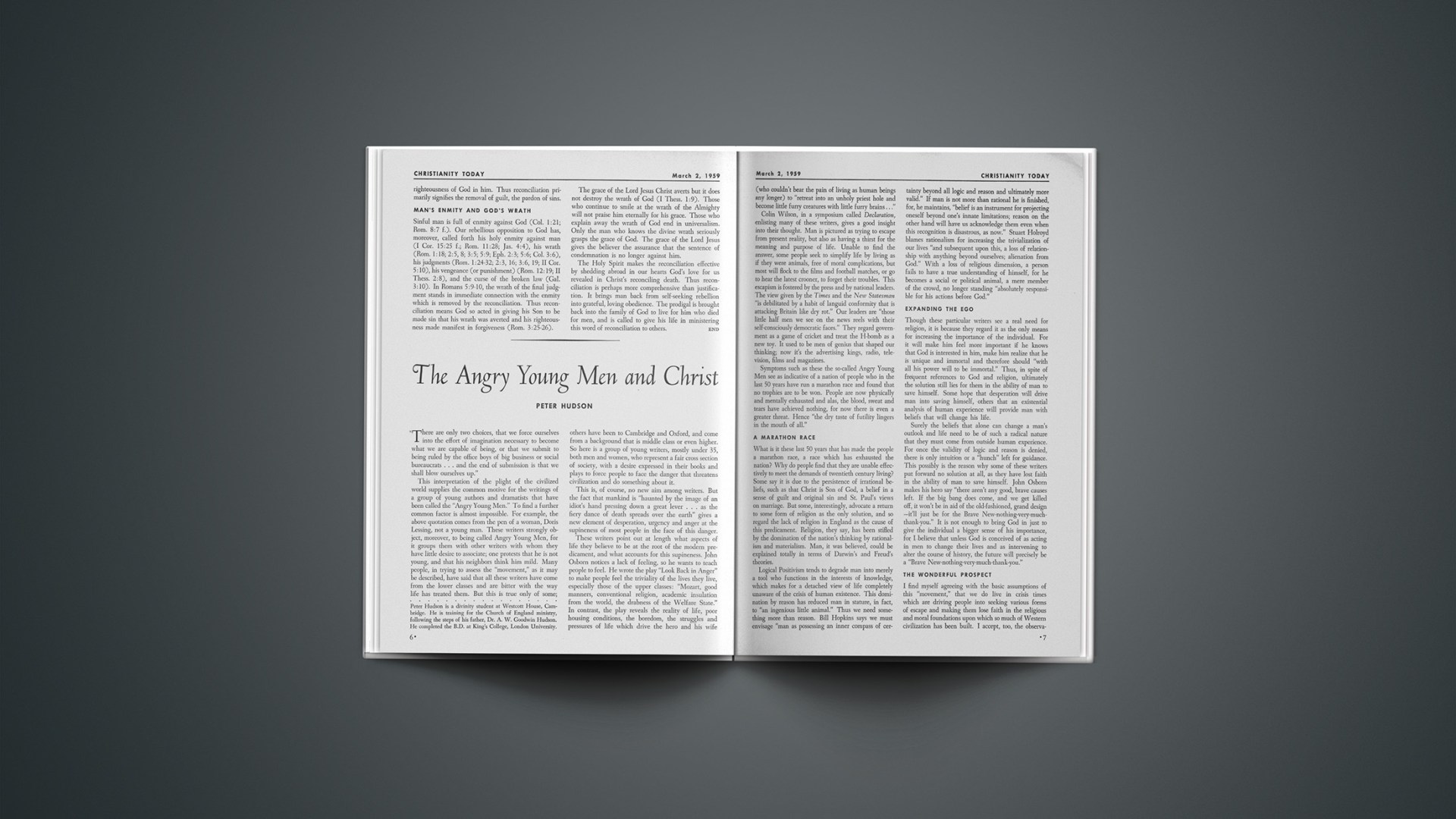“There are only two choices, that we force ourselves into the effort of imagination necessary to become what we are capable of being, or that we submit to being ruled by the office boys of big business or social bureaucrats … and the end of submission is that we shall blow ourselves up.”
This interpretation of the plight of the civilized world supplies the common motive for the writings of a group of young authors and dramatists that have been called the “Angry Young Men.” To find a further common factor is almost impossible. For example, the above quotation comes from the pen of a woman, Doris Lessing, not a young man. These writers strongly object, moreover, to being called Angry Young Men, for it groups them with other writers with whom they have little desire to associate; one protests that he is not young, and that his neighbors think him mild. Many people, in trying to assess the “movement,” as it may be described, have said that all these writers have come from the lower classes and are bitter with the way life has treated them. But this is true only of some; others have been to Cambridge and Oxford, and come from a background that is middle class or even higher. So here is a group of young writers, mostly under 35, both men and women, who represent a fair cross section of society, with a desire expressed in their books and plays to force people to face the danger that threatens civilization and do something about it.
This is, of course, no new aim among writers. But the fact that mankind is “haunted by the image of an idiot’s hand pressing down a great lever … as the fiery dance of death spreads over the earth” gives a new element of desperation, urgency and anger at the supineness of most people in the face of this danger.
These writers point out at length what aspects of life they believe to be at the root of the modern predicament, and what accounts for this supineness. John Osborn notices a lack of feeling, so he wants to teach people to feel. He wrote the play “Look Back in Anger” to make people feel the triviality of the lives they live, especially those of the upper classes: “Mozart, good manners, conventional religion, academic insulation from the world, the drabness of the Welfare State.” In contrast, the play reveals the reality of life, poor housing conditions, the boredom, the struggles and pressures of life which drive the hero and his wife (who couldn’t bear the pain of living as human beings any longer) to “retreat into an unholy priest hole and become little furry creatures with little furry brains …”
Colin Wilson, in a symposium called Declaration, enlisting many of these writers, gives a good insight into their thought. Man is pictured as trying to escape from present reality, but also as having a thirst for the meaning and purpose of life. Unable to find the answer, some people seek to simplify life by living as if they were animals, free of moral complications, but most will flock to the films and football matches, or go to hear the latest crooner, to forget their troubles. This escapism is fostered by the press and by national leaders. The view given by the Times and the New Statesman “is debilitated by a habit of languid conformity that is attacking Britain like dry rot.” Our leaders are “those little half men we see on the news reels with their self-consciously democratic faces.” They regard government as a game of cricket and treat the H-bomb as a new toy. It used to be men of genius that shaped our thinking; now it’s the advertising kings, radio, television, films and magazines.
Symptoms such as these the so-called Angry Young Men see as indicative of a nation of people who in the last 50 years have run a marathon race and found that no trophies are to be won. People are now physically and mentally exhausted and alas, the blood, sweat and tears have achieved nothing, for now there is even a greater threat. Hence “the dry taste of futility lingers in the mouth of all.”
A Marathon Race
What is it these last 50 years that has made the people a marathon race, a race which has exhausted the nation? Why do people find that they are unable effectively to meet the demands of twentieth century living? Some say it is due to the persistence of irrational beliefs, such as that Christ is Son of God, a belief in a sense of guilt and original sin and St. Paul’s views on marriage. But some, interestingly, advocate a return to some form of religion as the only solution, and so regard the lack of religion in England as the cause of this predicament. Religion, they say, has been stifled by the domination of the nation’s thinking by rationalism and materialism. Man, it was believed, could be explained totally in terms of Darwin’s and Freud’s theories.
Logical Positivism tends to degrade man into merely a tool who functions in the interests of knowledge, which makes for a detached view of life completely unaware of the crisis of human existence. This domination by reason has reduced man in stature, in fact, to “an ingenious little animal.” Thus we need something more than reason. Bill Hopkins says we must envisage “man as possessing an inner compass of certainty beyond all logic and reason and ultimately more valid.” If man is not more than rational he is finished, for, he maintains, “belief is an instrument for projecting oneself beyond one’s innate limitations; reason on the other hand will have us acknowledge them even when this recognition is disastrous, as now.” Stuart Holroyd blames rationalism for increasing the trivialization of our lives “and subsequent upon this, a loss of relationship with anything beyond ourselves; alienation from God.” With a loss of religious dimension, a person fails to have a true understanding of himself, for he becomes a social or political animal, a mere member of the crowd, no longer standing “absolutely responsible for his actions before God.”
Expanding The Ego
Though these particular writers see a real need for religion, it is because they regard it as the only means for increasing the importance of the individual. For it will make him feel more important if he knows that God is interested in him, make him realize that he is unique and immortal and therefore should “with all his power will to be immortal.” Thus, in spite of frequent references to God and religion, ultimately the solution still lies for them in the ability of man to save himself. Some hope that desperation will drive man into saving himself, others that an existential analysis of human experience will provide man with beliefs that will change his life.
Surely the beliefs that alone can change a man’s outlook and life need to be of such a radical nature that they must come from outside human experience. For once the validity of logic and reason is denied, there is only intuition or a “hunch” left for guidance. This possibly is the reason why some of these writers put forward no solution at all, as they have lost faith in the ability of man to save himself. John Osborn makes his hero say “there aren’t any good, brave causes left. If the big bang does come, and we get killed off, it won’t be in aid of the old-fashioned, grand design—it’ll just be for the Brave New-nothing-very-much-thank-you.” It is not enough to bring God in just to give the individual a bigger sense of his importance, for I believe that unless God is conceived of as acting in men to change their lives and as intervening to alter the course of history, the future will precisely be a “Brave New-nothing-very-much-thank-you.”
The Wonderful Prospect
I find myself agreeing with the basic assumptions of this “movement,” that we do live in crisis times which are driving people into seeking various forms of escape and making them lose faith in the religious and moral foundations upon which so much of Western civilization has been built. I accept, too, the observation that the rationalism of the age and the pressures of life have exhausted mankind, making him virtually an animal, a “smashed radio set”—to quote Colin Wilson. But if my radio set does go wrong I take it to the maker who will remake it. “And the vessel was marred in the hand of the potter and he made it again … And the Lord said … cannot I do with you as this potter?” This is the wonderful fact of Christianity that “if any man be in Christ, he is a new creation.” A man can have the renewing power of Christ in his life as “an inner compass of certainty.” He can have the belief and also the strength of Christ which over-came even death itself, to enable a man living today to “project himself beyond his innate limitations.”
But why do these so-called Angry Young Men fail to realize that Christianity can remake people, a need which they regard as man’s greatest, and prefer to put their hopes on a new religion yet to be devised?
John Wain observes that in order to communicate, a “touch” must be found that will reach society. To find this touch we must become involved in the flux of life. Judging by the success of some of the books and plays of this “movement,” we who endeavor to communicate Christianity might well be able to learn from the criticism these men make of the Church’s witness.
Colin Wilson admits that in previous centuries Christianity did provide the ordinary man with a meaning and purpose for his life, but though Christianity is still widely accepted and believed, “it is no more accepted nowadays than the Greek gods were in the time of Socrates or the Roman gods in the time of Marcus Aurelius.” This, I think, reflects on the weakness of the witness of the Church over the main lines of communication.
It means that Wilson has never heard, read or seen a Christian who has convinced him that God to him is more than a fairy story. John Osborn gives a reason for this. He finds Christianity as presented to the public in the press, on radio or television, as insincere and unconvincing because after “half a century of watching groups of wealthy theologians publicly turning their backs on Jesus,” the British public slowly began to realize that Christianity was just another “word game like politics.” Emil Brunner has said that “the fate of the Bible is the fate of Christianity,” and surely the giving way to certain aspects of biblical criticism has taken the conviction and the power out of the Church’s witness.
Stuart Holroyd says people regard Christianity as a series of actions—do good, love your neighbor—which do not spring from an inner condition. Hence he sees the exhortation to the good life, so common in pulpits today, as applying a “lotion to the body in order to cure a deep rooted inner disease.” Yet Christ himself said “except a man be born again, he cannot see the kingdom of God.” Though the new birth I believe, is the vital message for our modern predicament, it is apparently not getting through to the people.
Bill Hopkins says that “the Church died after the passing of its first visionaries” because soon orthodoxy, tradition and custom crucified the once living statements of Christ. The Church does not rely on tradition and the efforts of men to preserve its life, but upon the action of the risen Christ and his life-giving Spirit. The Church should be the most alive community on earth, yet according to Hopkins this life is not much in evidence.
Even if the diagnosis and the above criticisms of these writers and dramatists are only partly right, they give us a picture of a world full of uncertainty, bewilderment and fear, a world where the strength, the presence and guidance of Christ are not only not known, but are also regarded as quite irrelevant. The only way to make him relevant is to present the Gospel with the authority and conviction that come from knowing that it is the Word of God and that our churches become akin to the potter’s house where men may see God at work in remaking the lives of men, women and children.
END
Preacher in the Red
It was a raw November Sunday night in London, and the Men’s Lodging House common room was crowded with the flotsam and jetsam of the metropolitan streets. Most were dozing or talking. A few were listening to the service conducted by a Mission Band based on Methodism’s West London Mission, Kingsway Hall. As an exceedingly raw but earnest teenage recruit to the ranks of “local preachers,” it was my turn to attempt the address. With ambition only equalled by an entire lack of discretion, I had chosen the well-known text “Thou art Peter, and upon this rock, etc.” “Of course,” I asserted with more assurance than learning, “Jesus was in fact punning upon the word “Peter,” which in the Hebrew tongue is ‘petros,’ a rock.” Came a sudden commotion. A man in a rusty black suit, by the fireplace, shook himself and called loudly “No!” I felt the blood rush to my face. My interrupter continued with unabated vigor, to shake his head and disagree vocally, throughout the rest of what rapidly became a foreshortened and increasingly incoherent attempt at preaching. The service finished hurriedly, and my critic bore down authoritatively upon me. His suit was in tatters, he was an authentic down-and-out, but his voice had overtones of much better days gone by. “You’re quite wrong,” he said decisively. “It’s not Hebrew at all, it’s Greek. And it’s not ‘petros’, it’s ‘petra’. And you really shouldn’t talk about things you know next to nothing about.” I’ve tried to avoid doing so, ever since.—The Rev. LEONARD P. BARNETT, Methodist Youth Department, Ludgate Circus House, London, England.
Peter Hudson is a divinity student at Westcott House, Cambridge. He is training for the Church of England ministry, following the steps of his father, Dr. A. W. Goodwin Hudson. He completed the B.D. at King’s College, London University.










